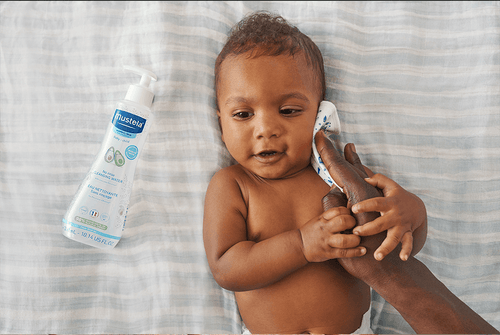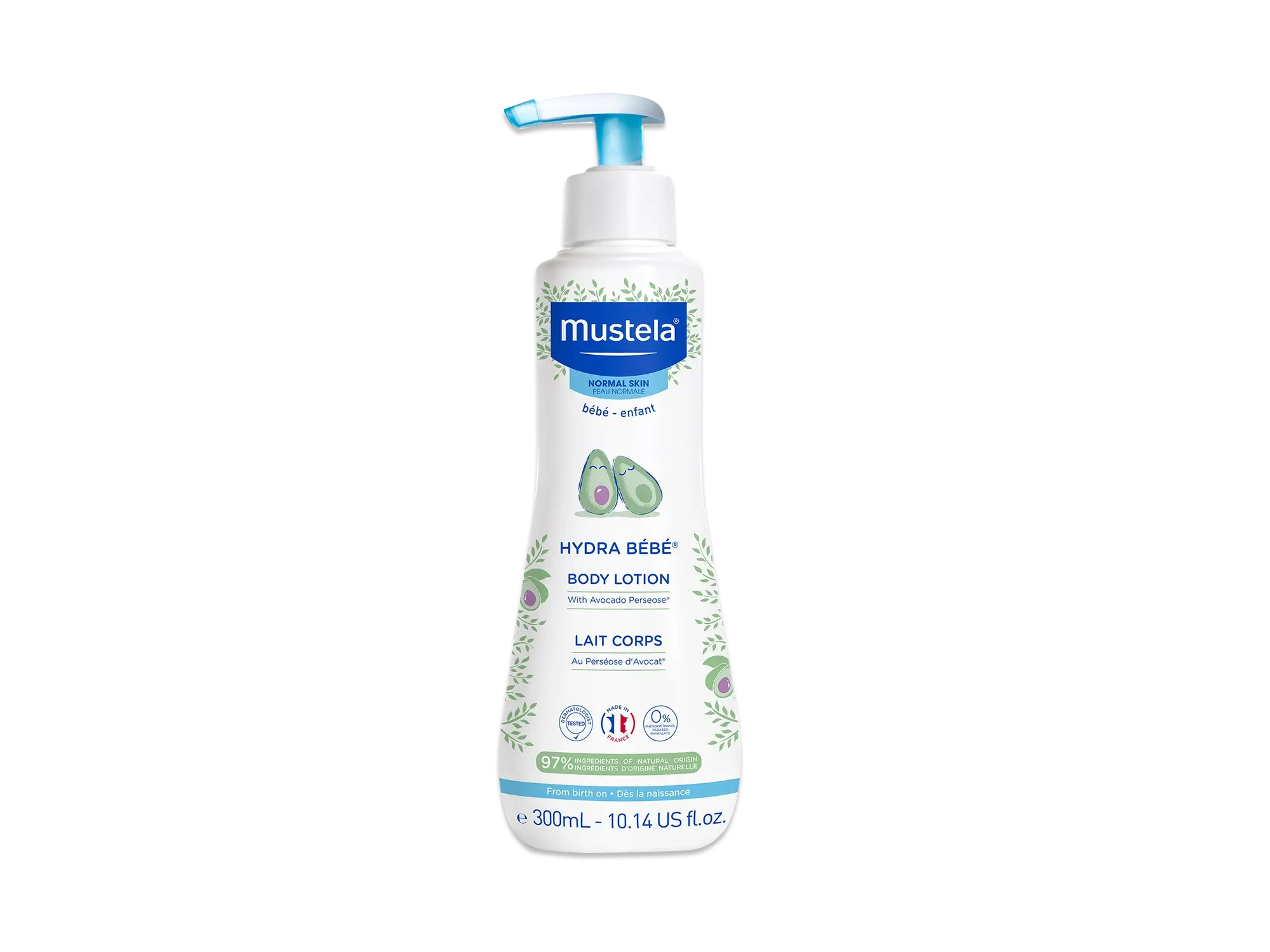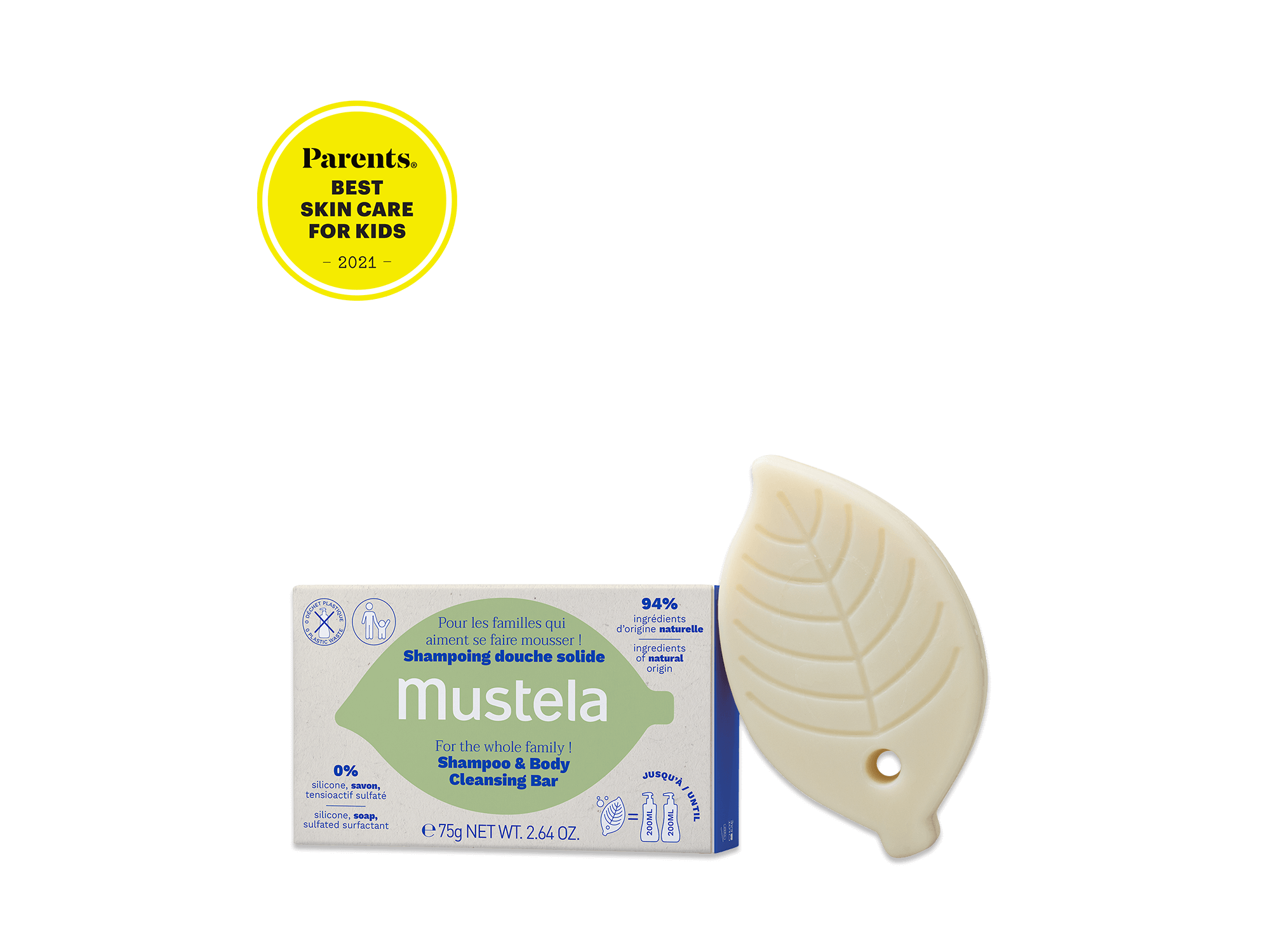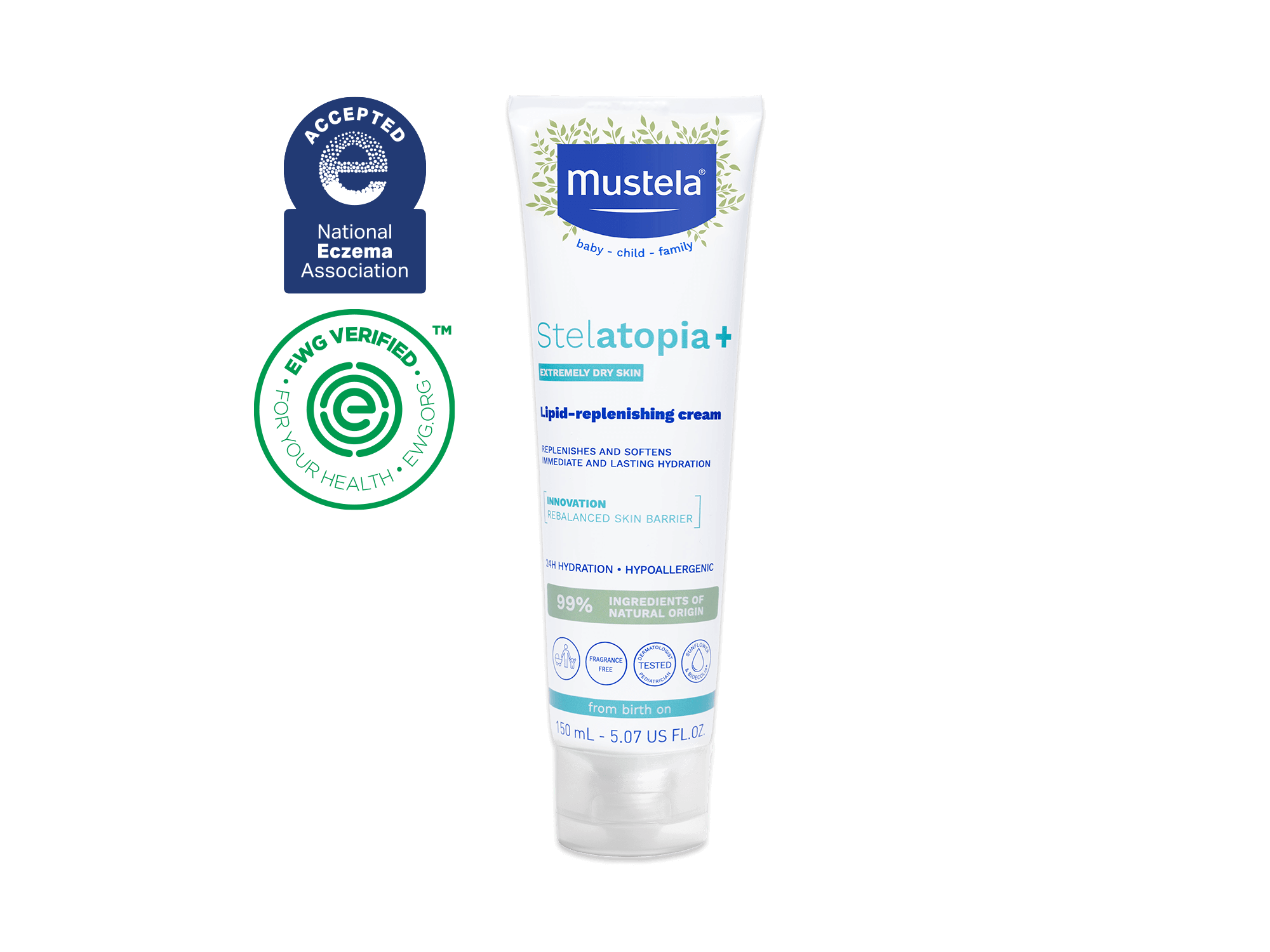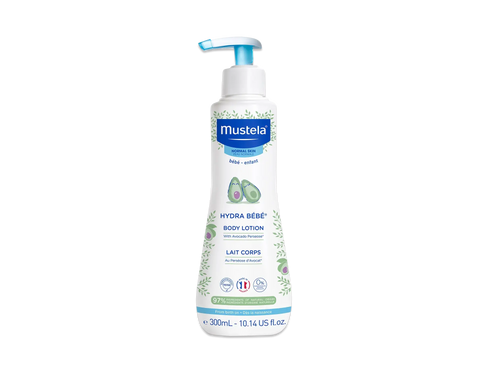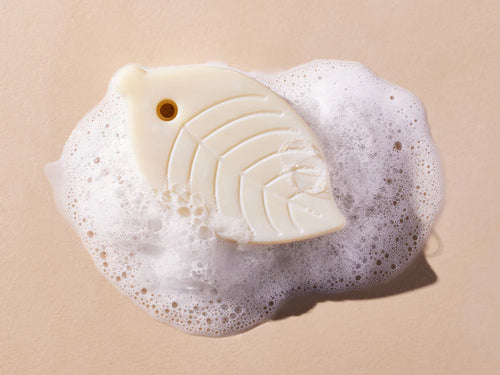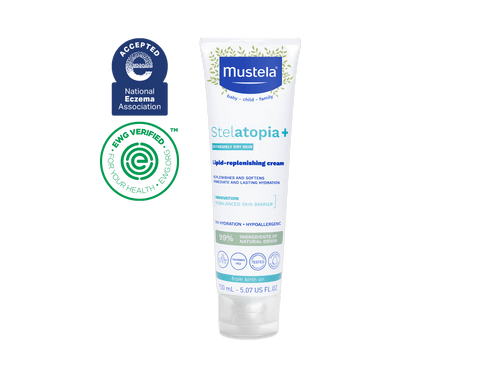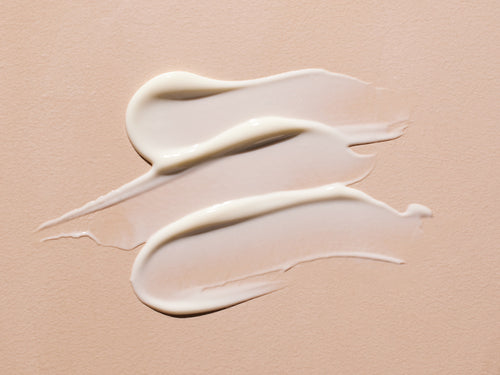When you think about it, buying newborn baby gifts seems like one of the easiest things ever. After all, you could probably purchase anything without the baby really knowing or remembering down the road what you bought. However, their parents will.
Be it for a baby shower or just a gift to say, “welcome to the world,” when a baby is born, the once-in-a-lifetime occasion calls for newborn gifts. Deciding what to buy a new little guy or girl, however, can be a bit overwhelming.
These days, the possibilities are endless when it comes to all of the products and gear for newborns. That’s why the experts at Mustela are here to share the top 42 newborn gifts that new parents will actually use in 2025.
Table Of Contents
The 42 Best Newborn Gifts

For Baby
1) A Complete Newborn Arrival Set
Sensitive newborn skin deserves only the best care, and Mustela’s baby skincare products deliver just that. The Mustela Newborn Arrival Gift Set contains everything they need to keep their baby’s skin soft and fresh from head to toe.
The gift set is a great way for the new parents to try the products before purchasing full-size bottles, and it’s perfect for packing in diaper bags or luggage for when baby’s on the go.
The Newborn Arrival Gift Set includes five essential, natural skincare products specifically designed for a newborn's delicate skin: Foam Shampoo for Newborns, Gentle Cleansing Gel, No-Rinse Cleansing Water, Hydra Bébé Body Lotion, and Diaper Rash Cream 1 2 3.
All of these products are free of questionable ingredients, like parabens, phthalates, and phenoxyethanol.
2) Soft Socks

No one likes cold feet, especially a newborn! Gift a cute pack of socks to keep the new little one's feet warm.
Socks are necessary for all the seasons of the year, and parents will need plenty of pairs because these little socks are bound to get lost in the chaos (or the laundry!).
3) A Sassy Set Of Shoes
A new pair of comfy and stylish kicks are the sweetest gift for little ones who aren't up and walking yet but still need a layer of warmth over their socks in cold weather. Trendy shoes with cute colors and patterns will definitely put you at the top of the list of coolest newborn gift-givers.
4) Mittens
Prevent the little one from scratching themselves and keep their tiny hands warm at the same time with no-scratch mittens. Newborn mittens are precious, itty-bitty, useful, and a great gift by themselves or as an addition to another gift.
5) Quality Bibs

While baby’s drooly smiles are adorable, they can lead to wet clothes and drool rash. A fresh set of bibs will help prevent that — in style.
Opt for bibs made from organic cotton and fleece, as they’re soft and absorbent and keep clothes dry. Also, look for a set that’s adjustable so they can grow with baby into toddlerhood.
6) Safe Bath Products
Handy for both parents and newborns, bathtime sets, like our Bathtime Essentials Set, are the perfect gift to ensure a clean and happy newborn. Bath sets often include safe, effective products that are sure to make getting clean a breeze for both baby and parent.
This Bathtime Essentials Set includes four essential plant-based skincare products to keep their baby clean and moisturized during and in-between bath time.
We believe that bath time should be both fun and therapeutic for a little one’s skin. That’s why our bathtime gift set includes a safe and gentle Multi-Sensory Bubble Bath. These foaming bubbles provide bathtime fun while protecting and hydrating baby’s skin.

This formula is composed of 91% ingredients of natural origin per ISO 16128 standard, including marine extracts to help maintain the skin's water balance, cornflower extract to soften the skin, and our signature avocado perseose to help protect and hydrate.
Pair a set of bathtime skincare products with a cute bath toy, and you’ve got the perfect newborn baby gift.
7) A Baby Tub
The very first bath for newborns will be a sponge bath. But, in no time, the little one will graduate to a larger bathing space. Give a baby tub for their first tub bath.
8) A Hooded Towel
While any towel will get baby dry, hooded towels are cute, functional, and make a great newborn baby gift. Have it embroidered with their name or initials for an extra-special touch.
9) A Baby Teether

This little gift will earn you huge bonus points with the new parents when teething time comes along. A good teether should be long enough to reach the baby’s molars but not so long that the baby could potentially hurt themselves.
10) A Cozy Blanket
Every baby needs a special blanket, and those made with ultra-soft fabric and decorative designs make the perfect baby gift. Textured, soft blankets also provide the new baby with safe surfaces to explore and touch.
11) A Safe Toy
The best newborn baby toys are all-natural, soft, rubber, squishy, fuzzy, and perfect for infants to grab on to and play with.
They come in all sorts of designs — from animals, blocks, and balls to cars, trucks, and elephants on wheels — and are the perfect addition for a newborn’s playroom or nursery. After all, no baby can have too many toys.
12) Toys That Promote Development

Similar to tickling your newborn with a feather, you can exercise your baby’s sense of touch with sensory toys like a rattle, activity balls and blocks, and pop-up toys. These stimulating toys are not only fun but help your baby learn.
While this might not seem like the ideal newborn baby gift, keep in mind that, before you know it, your friend’s baby will be having solo tummy time, rolling over, and looking for things to keep them occupied.
13) A Perfect Pacifier
Pacifiers have gotten a bit of an upgrade over the last few years. Nowadays, many designs are not only cute to look at but are also manufactured to help keep the pacifier on your baby’s chest.
Pacifiers make the perfect newborn gifts because they are suitable for newborns through 6-month-olds since once babies start teething, they may bite through it.
14) Baby Gear
Help the parents-to-be set up their baby’s nursery, or provide the little one with safety gear.
If you’re looking for a budget-friendly baby gear gift, consider a baby swing, floor seat, highchair, or bouncer. All of these have portable options, making them great gift ideas for the family who’s always on the go!
And if you want to splurge on a gift for the newborn, a crib, mattress, stroller, or car seat are all top-notch ideas! Go in with a few friends or family members to give one of these bigger-ticket items.
The good thing with baby gear gifts: You know the parents and their baby will actually use them!
15) Swaddles
Swaddles are a safe and comfy option for keeping a baby warm and cozy while they sleep. Mom and dad can wrap their baby up tightly with a swaddle to mimic the feeling of mom’s womb.
Plus, swaddling helps babies fall asleep and stay asleep. Infants tend to startle themselves while they’re sleeping, but swaddling helps them feel snug and secure.
If you don’t know which type of swaddle to get, velcro swaddles are a great place to start. They’re a little bit easier to use than an actual swaddle blanket and help mom and dad correctly swaddle their baby!
16) A Fun-In-The-Sun Gift Set
While the American Academy of Pediatrics recommends that parents keep babies under six months old out of direct sunlight, a fun-in-the-sun gift means that your favorite newborn is prepared for their first outdoor adventure.
This is a perfect newborn baby gift for little ones born in the winter. They’ll be six months old around summertime and ready for sunny playtime!
Include a cute swimsuit, a fun pool or beach toy, and baby-safe sunscreen. We recommend a sunblock made with non-nano zinc oxide, such as our Mineral Sunscreen Spray, Mineral Sunscreen Stick, or Mineral Sunscreen Lotion.

These fragrance-free sunscreens are safe enough for baby skin and effective enough for adults to use! And all of them have received the Seal of Recommendation from the Skin Cancer Foundation.
If you’ve never read about the differences between mineral and chemical sunscreens, check out our article here.
17) Baby Clothes
The new parents might have received baby clothes at their baby showers, but there are never enough adorable onesies, tiny pants, or cute dresses.
If you can get an idea of exactly what type of clothing they need, even better.
18) Diaper Cream

If there’s one baby item that parents of a newborn will use lots of, it’s diapers. And diaper cream to accompany every diaper change! Give them the gift of diaper cream options with Diaper Rash Sprayable Cream, Diaper Rash Cream 1 2 3, or Diaper Cream with Olive Oil and Aloe.
A sprayable diaper cream? Yep. Our Diaper Rash Sprayable Cream offers touch-free spray application and helps to seal out wetness while soothing and protecting baby skin.
It’s made with 99% ingredients of natural origin per ISO 16128 standard, including non-nano zinc oxide, shea butter, chamomile, and calendula.
Or, for parents who opt for organic options, go with our Diaper Cream with Olive Oil and Aloe which is made with organic aloe vera, organic sunflower seed oil, and organic olive oil.
19) A Name Puzzle
If the parents were waiting to name their little one, now is the ideal time to buy the new baby personalized gifts. Consider a name puzzle that serves as a unique nursery decoration now and will be fun for the little one as they get older.
20) A Nursery Chair
A pint-sized chair is a fun addition to any nursery or kids’ room. Whether it’s a rocking chair or a lounge chair that sports the child’s name or simply a fun pattern, it’s sure to be a favorite for years to come.
21) Nursery Decor
Speaking of nursery additions, once you know the theme or color scheme, nursery decor makes a fun gift that lets the parents know that you’re paying attention!
For Parents

22) A Baby Carrier Or Wrap
The new parents are learning to juggle everyday life with a newborn, and sometimes their hands need to rest. With a baby carrier (or wrap), parents can hold their baby close to their chest while having their hands free.
Whether mom and dad need to do a little bit of work or get some things done around the house, a baby carrier will become their lifesaver! Plus, they’re great to use when the new parents want to go on a walk as a family!
23) A Rocker Or Glider
Every parent dreams of the memories they’ll make with their baby. You can make this dream a reality by getting the parents a rocker (or glider).
This might be one of those splurge items, so consider going in with a friend or family member to give this gift.
Mom and dad can rock their sweet baby to sleep each night in this rocker. They’ll sing songs, read books, and tell stories in it. This will be a gift that keeps on giving for years to come!
24) Milestone Age Blocks
For all those milestone pictures parents like to take, these blocks add some pizazz. Parents will get years of use from them, as they can be stacked to record how many days-, weeks-, and years-old a child is.
There’s even one to indicate grade, so they can be used for all those first-day-of-school photos throughout the years.
25) A Photo Album
New parents are never short of photos of their brand new baby! Give them a place to store all the memories and snapshots. Photo albums come in all shapes, sizes, and colors. You’re sure to find one that fits the family’s style.
26) Easy-Change Crib Sheets

If you’ve ever had to change a crib sheet due to an accident in the middle of a sleepless night, then you’ll realize exactly how brilliant an easy-change sheet is.
No more trying to tug and pull and get the corners to each stay put without pulling another one out. This innovative sheet has a bottom base that wraps around the mattress and stays put safely and securely. When it’s time to change the sheet, parents simply zip off the top portion and zip on another one.
27) A Diaper Bag
Every new parent needs a functional diaper bag. You’ll want to invest in gifting a diaper bag that is both sleek and functional, with many compartments to safely and securely carry all of the supplies new parents need on a daily basis.
And while you’re at it, don’t forget about the must-haves for the diaper bag! Take your gift up a notch and pack the diaper bag full of essentials to give as a gift. The parents-to-be will be over the moon with this already stocked diaper bag!
Organic Cotton Wipes with Water are another diaper bag essential. What makes these wipes so amazing is that they’re not just for baby. Moms can use them for quick make-up removal, too!
They’re also good for the earth. The organic aloe vera we use is grown in the highlands of Mexico and comes from farms that meet fair-trade requirements. Our organic cotton is 100% recycled from the textile industry, and the packaging contains up to 10% recycled plastic.
We can’t forget about one more essential: our Organic Micellar Water with Olive Oil and Aloe. For a quick on-the-go cleanup, grab a cloth or cotton ball and use the cleansing water to gently clean your baby’s face, body, or diaper area. No need to rinse with water! It’s really that simple.
28) A Tote Bag
If you know that the new parents already have a fully-equipped diaper bag, go with a stylish and practical tote bag. This will be used for different purposes than the diaper and will be enjoyed for years to come.
29) A Document Organizer
Babies and kids come with a lot of paperwork. A document organizer isn’t the most exciting gift, but it sure is useful.
30) Skincare Products

Skin care isn’t just important for the new baby; it’s also crucial for the new mother. Look for natural skincare products that are safe for moms who are breastfeeding postpartum.
Our Organic range has just what you’re looking for when it comes to safe and effective skin care for the whole family. These vegan, fragrance-free products are sustainably sourced, EWG-verified, and made with olive oil.
We use olive oil sourced from France, where the olives undergo a very detailed process to give skin the safest and most soothing nourishment.
To start, our Organic Hydrating Cream With Olive Oil And Aloe can take care of the whole family. It’s safe enough for babies to use and effective enough for parents to use! Mom, dad, and baby can experience soft, hydrated skin with this cream!
You can also pair this with our Organic Cleansing Gel With Olive Oil And Aloe in the Organic Bath And Body Gift Set to cleanse and nourish the skin naturally.
We also recommend our Multi-purpose Balm with 3 Avocado Extracts. This all-in-one can be used by the whole family, is eco-friendly and EWG Verified, and comes in a convenient travel size.
31) Nipple Cream

When you take care of the new mom, you’re taking care of the newborn, too. If mom is breastfeeding, give her a nipple cream, such as our Nursing Comfort Balm.
Made with 100% ingredients of natural origin per ISO 16128 standard, this nipple cream protects her nipples, eases discomfort, and helps replenish her skin during and after breastfeeding. It’s vegan, free of fragrance and dye, and enriched with vitamin E to nourish and protect her skin.
To expand the gift, consider adding a cute nursing cover or a breastfeeding pillow to help her find a comfortable position.
32) Stretch Marks Products
Help mom keep her skin in tiptop shape with our Stretch Marks Cream. This cream helps reduce the appearance of stretch marks during pregnancy and leaves her skin comfortable and smooth!
Another safe and effective product for moms is our Stretch Marks Oil. It’s made with 100% ingredients of natural origin per ISO 16128 standard, so it’s safe for mom and baby!
33) Flowers
Not every newborn baby gift needs to be directly related to the new parent or the new baby. Giving a gorgeous bouquet of flowers to the new parents will be a bright spot in their day and add a pop of color to their home.
It’s a great way to let them know that you’re thinking of them and there for them.
34) Jewelry
New jewelry is fun, but for a new mom, jewelry that features her new baby’s name or her newly acquired “mom” title is especially exciting.
35) A Plush Baby Mat
Because your new-parent friends can’t hold their newborn baby all the time, give them a safe place to put the child down while they enjoy their lunch or just take a short break. A quality newborn baby mat is super soft, grips the floor, and is machine washable for when baby spits up.
36) Milestone Cards

Much like milestone blocks, milestone cards make for a wonderfully sentimental gift.
Milestone cards highlight [insert the child’s name here — they can usually be personalized!] first-year milestones with fun animal drawings and extra space to fill in the pertinent details of said accomplishment.
They also provide a checklist of year-one milestones so their parents can tick them all off.
37) A Bedtime Book
Bedtime stories are something new parents will treasure forever. They will have fond memories of reading special books to their little ones before bed every night.
Margaret Wise-Brown’s classic Goodnight Moon is the perfect bedtime read. If you haven’t read this book, it’s the story of a sleepy rabbit saying goodnight to everything in his great green room, including your newborn.
It’s the perfect gift to help parents soothe their little one to sleep in the nursery.
38) A Sleeper Onesie With Diaper Changer
There’s nothing worse than finally getting a baby ready for bed only to realize that they had an accident and you have to start the whole process over again.
If the newborn baby was wearing a onesie with diaper access, however, that diaper change would be a breeze. Certain sleepers feature multiple zippers: one that runs from foot to collar for dressing, then another that runs along the inseam for easy diaper access.
You can help make changing a breeze by gifting one of these smartly designed pajama pairs.
And don’t forget to consider giving larger sizes, too. After all, newborns don’t stay tiny forever! Our Stelatopia Skin Soothing Pajamas make a great gift that parents can save for later.

These pajamas come with adjustable snaps and moisturize baby’s skin throughout the night!
Specifically designed for babies and toddlers with eczema-prone skin, these pajamas use microcapsule technology to soothe skin. Each microcapsule contains five natural ingredients: avocado oil, sunflower oil distillate, squalane, ceramides, and vitamin E.
These ingredients are activated when they come into contact with the little one’s skin and work to maintain the skin's moisture and replenish it with much-needed lipids.
Not only are these PJs made with OEKO-TEK® certified cotton, but they’re also endorsed by the National Eczema Association.
39) A Techy Monitor
Every new parent needs a monitor to be their eyes and ears when they’re not physically next to their little one. A high-quality monitor will set parents and baby up for added safety, security, and peace of mind.
40) A Parenting Book
If you know the new parents well enough to know their parenting style, give them a parenting book or two.
Feel like a parenting book is too intense? Opt for fun, no-thinking-required reading material. Every parent needs a mental break every now and then.
41) Comfy Clothes
Nice loungewear is always handy to have, especially for new parents. And even more so for postpartum moms who don’t have clothes that fit well right now. Give the gift of comfort with slippers, yoga pants, joggers, cute cotton tees, athleisure wear, and the like.
42) A Gift Card
For a gift that the new parents can use for whatever they need, don’t hesitate to turn to the tried-and-true gift card option. Whether it’s a generic gift card, money at their favorite restaurant, or a Mustela eGift Card, they’ll be happy.
Giving the Perfect Newborn Baby Gift

With the above options, you’re sure to be the greatest gift-giver in the history of newborn baby gifts. Use these top-of-the-line ideas for inspiration when purchasing your next new baby gift.
Remember to keep the baby and the parents-to-be in mind when you’re in the market for a newborn gift. Consider a Bathtime Essentials Set, swaddles, baby clothes, or a name puzzle for baby and a baby carrier, jewelry, or comfy clothes for the parents.
And give the mom-to-be a special treat for her skin with Mustela’s Maternity Collection, Organic Bath And Body Gift Set, or a convenient Mustela eGift Card!

